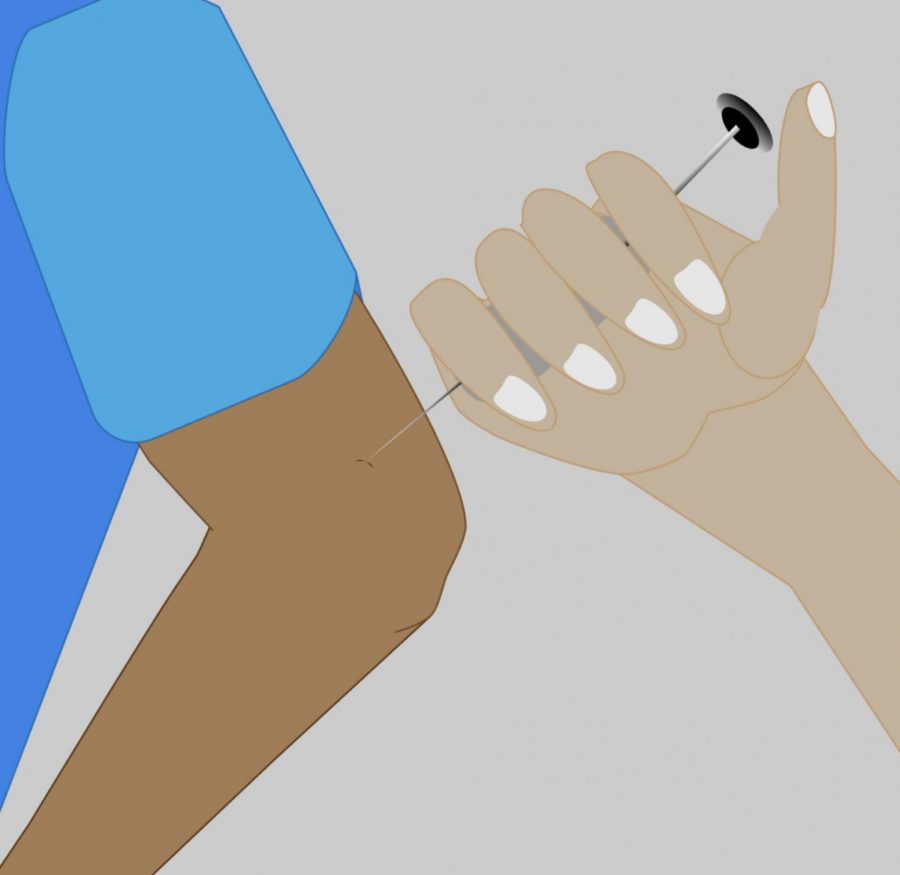Community health student shares vaccination experience
January 14, 2021
Mid December, the first vaccination was administered in the United States to protect against COVID-19. This moment shifted the plan of attack in fighting the pandemic. It began the transition from efforts encouraging social distancing and masking to efforts in vaccinating individuals in the hopes that they will never contract the virus (though social distancing and wearing masks will still be critical practices for the foreseeable future).
On Dec. 21, students received a Massmail informing them that the first COVID-19 vaccines had arrived in Champaign-Urbana. While it did not specify any specific plans for administering the vaccine to the entire student population, it excited many to know that a vaccine could be near.
One group of students who have managed to get the first shot of the vaccine already are the Coronavirus Testing Assistants who work with the SHIELD team. Delaney Foster, junior in AHS and one of the assistants, was excited to find out she qualified.
“I feel like, you know, it’s something that’s historic and so I was just very excited to be a part of this and be able to be one of the first ones to get the vaccine,” Foster shared.
Foster received an email from her boss informing her of the Coronavirus Testing Assistants’ eligibility to get the vaccine and she filled out the interest form. She said some students were working over break and were among the first to get the vaccine. Foster’s shot came soon after.
Get The Daily Illini in your inbox!
The first full week of January, she made her appointment with McKinley, headed back to campus, and got a negative COVID test result. On the seventh and the eighth, nurses were set up in CIRCE to administer doses of the Moderna vaccine.
“It took probably 20 minutes to do the whole thing, it was very easy,” Foster said. “Really, it was just a normal shot and then they have to watch you through 15 minutes after to make sure you don’t have an allergic reaction and then it’s done.”
Many have been concerned what the aftereffects of the vaccine have been, but Foster said she did not have too many complaints. While she said her arm was very sore where the vaccine was injected, it just lasted a couple of days. All she had to do was apply some ice and take Ibuprofen.
Studying Community Health in the midst of a global health crisis has given her major unique context, Foster said. In her classes they have talked a lot about the pandemic. She said it has given her a more in-depth look at what is going on in the United States and around the world.
Beyond just her experience as a Community Health major, Foster plans to get her Master’s in epidemiology. Seeing one of the country’s top epidemiologists, Dr. Fauci, at work throughout the pandemic has been interesting for her.
As the U.S. begins it’s vaccine rollout, she said she has witnessed the mass hysteria about what is in the vaccine. Foster said that is not what should be at the front of people’s minds.
“It wouldn’t be FDA-approved it if wasn’t safe to use,” she said. “I think this is kind of something that you have to trust the health experts on and I think it’s just important to keep that in mind instead of listening to whatever unqualified people have to say about it.”
She did say that she thinks it has been moving slower than many would hope. Not enough people are being vaccinated quickly enough; however, she did say they have the opportunity to become more efficient as it is still quite early on.
Her real hope, she said is that more people are willing to take it once it comes time for the general population to receive their doses. She encourages everyone to listen to the experts in health, opposed to others who may have a more political agenda with their messages.
“They don’t really have all the knowledge and the history that they know, so I think it’s more important to look at the type of people you’re listening to rather than the information you’re listening to,” she said.
Foster said she looks forward to receiving her second dose the first February. While the vaccine’s availability to the general student population may be a couple months away, she said she has confidence the University will handle it the best they can.
“I feel very lucky that I ended up with this opportunity,” she said. “When I went in, there were six nurses and they were ready to roll out the vaccine as soon as possible and so that was really great and exciting to see.”







